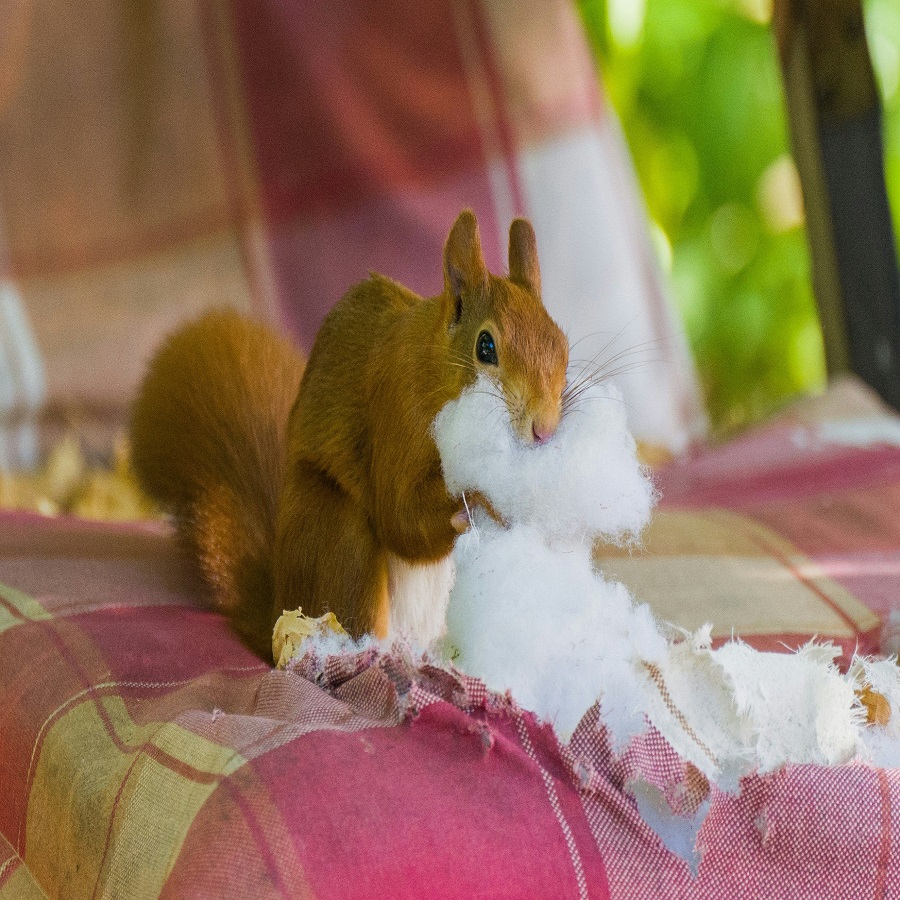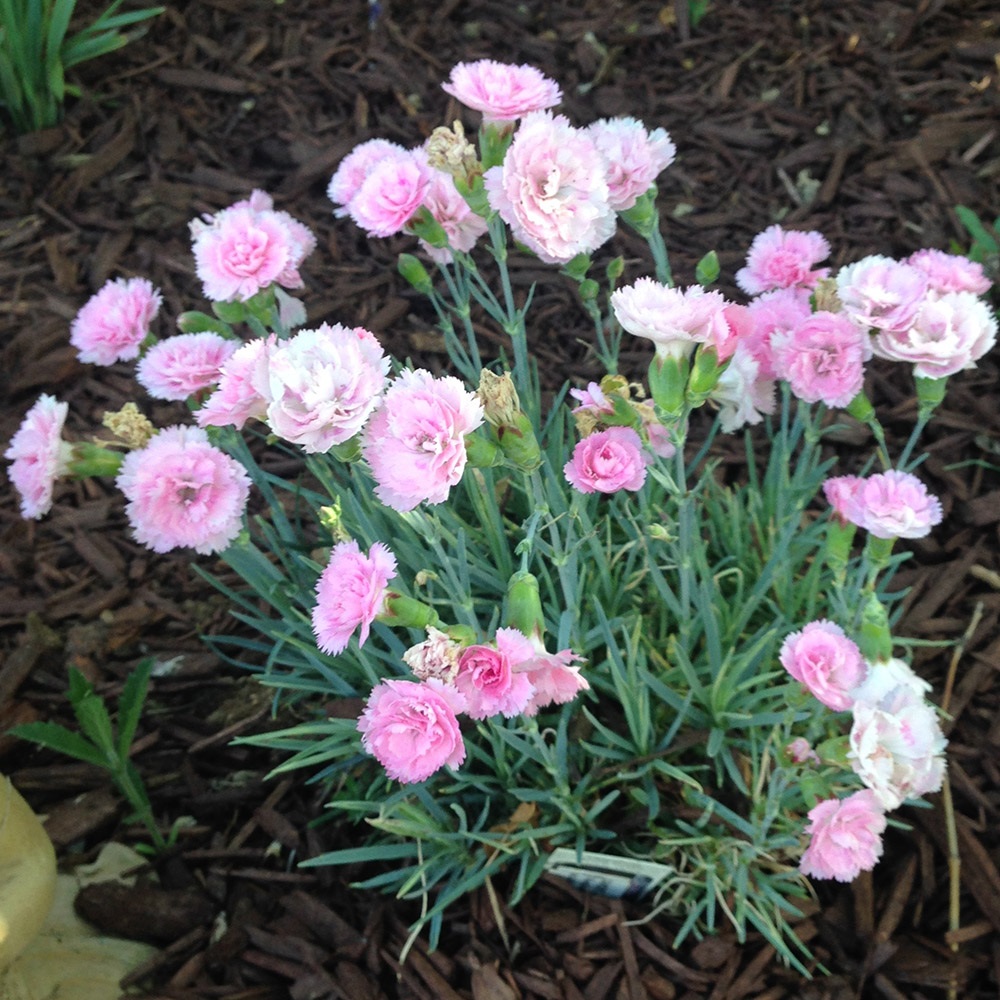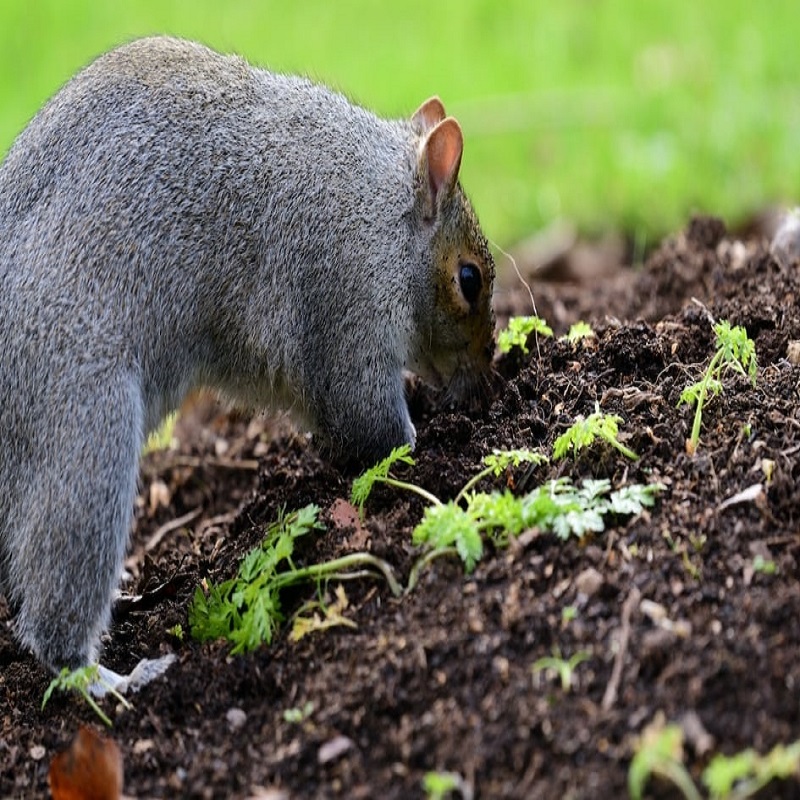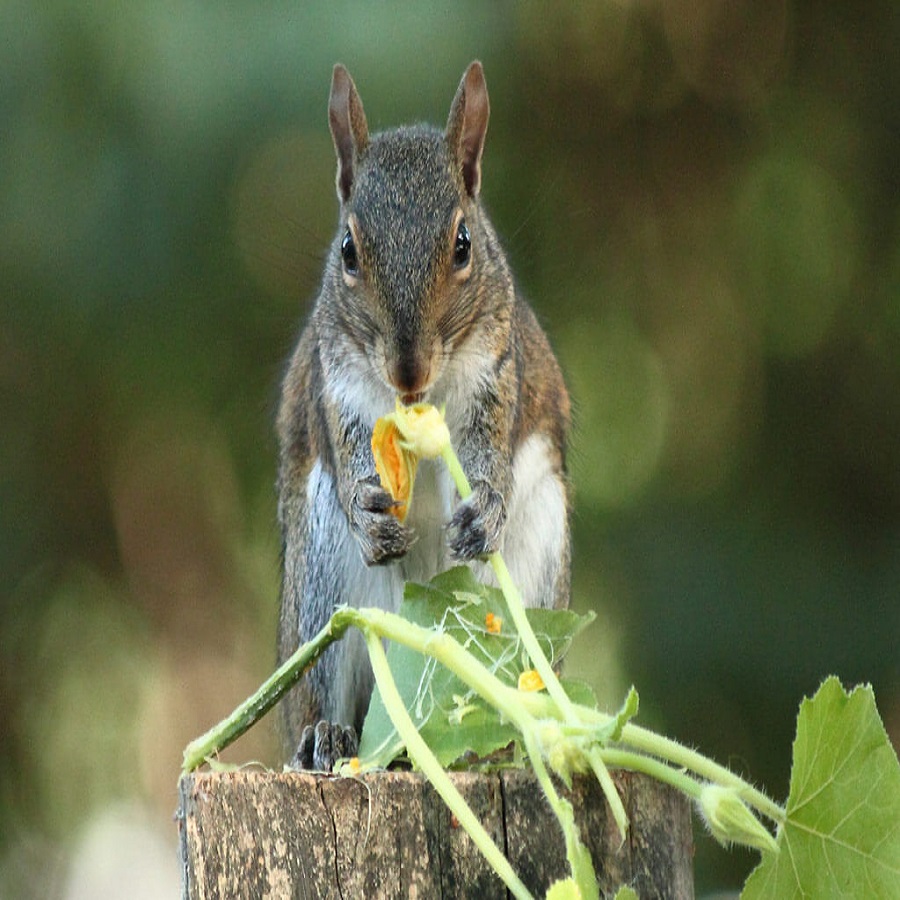Why Squirrels Dig in Potted Plants
Understanding why squirrels dig in your flower pots is crucial for finding effective deterrents.
The Attraction to Potting Soil
Squirrels are drawn to potting soil for its soft and easy-to-dig nature. Unlike the hard, compacted soil found in most gardens, potting soil in your flower pots is fluffy and inviting for these critters. It provides the perfect medium for them to bury and retrieve their food caches, which often leads to disrupted plants and a mess for gardeners to clean up.
The Search for Food and Storage
Squirrels foraging behavior is mostly about survival. They seek out your potted plants as food storage zones. These areas appear safe to them for hiding their acorns, nuts, and other snacks. During their search, they may also stumble upon and consume the roots and bulbs of your cherished plants. This natural instinct to dig and store food means that being frustrated with them isn’t a solution. Understanding their behavior is essential in creating strategies to protect your plants.

Natural Repellents and Barriers
Using Spices and Herbs as Deterrents
A variety of spices and herbs can naturally deter squirrels. Ingredients like cayenne pepper, chili flakes, and garlic provide strong smells that squirrels find unpleasant. These can be sprinkled directly onto the soil or mixed into a homemade spray. Implementing a spice mix with ingredients like black pepper or mint increases your chance of keeping these critters away. Remember, frequent reapplication is necessary as the smells fade over time.
Physical Barriers: Wire Cages and Wraps
Creating physical barriers is an effective method to keep squirrels out. Placing chicken wire or plastic netting around or over your potted plants blocks direct access. For larger areas, wire cages enveloping the entire pot can prevent squirrels from reaching the plants altogether. Be sure to check these barriers regularly for any gaps or damage.
Reflective and Noisy Objects to Scare Squirrels
Squirrels are cautious creatures, easily startled by unfamiliar sights and sounds. Shiny, reflective objects such as aluminum foil balls, old CDs, or metallic tape can act as visual deterrents. They reflect light unexpectedly which scares squirrels away. You can hang these items around your garden. Noisy objects like wind chimes or aluminum pie pans work similarly, using sound to create an uncomfortable environment for squirrels. Ensure they are securely placed to withstand weather conditions.
Homemade Repellent Recipes
Gardeners can use common kitchen ingredients to create effective squirrel deterrents.
Cayenne and Black Pepper Spray
Make a squirrel-repellent spray with cayenne and black pepper. Mix two tablespoons of each in boiling water. Let it cool, then strain. Pour the mix into a spray bottle. Spray around your plants regularly. The strong scent keeps squirrels at bay.
Mint, Garlic, and Pepper Spray
Another recipe uses mint, garlic, and cayenne pepper. Crush a handful of mint leaves. Add two tablespoons of garlic powder and cayenne pepper. Cover with boiling water and let sit for a day. Strain and spray on the plants. This organic mix deters squirrels and is safe for your garden.
Safeguarding Large Planters and Decks
Safeguarding your outdoor spaces against squirrels is essential, particularly for those owning large planters and decks. These areas often feature a variety of plants which can attract these tenacious creatures, leading to the need for specific strategies.
Strategic Planting: Flowers Squirrels Dislike
One approach is strategic planting with species that squirrels find unappealing. Flowers such as marigolds, daffodils, and alliums emit scents that squirrels tend to avoid. Integrating these plants among your favorites can create a natural barrier. This method enhances the beauty of your garden while keeping it intact. Think of these plants as living repellents that safeguard your other blooms from squirrel intrusions.

Utilizing Motion-Activated Sprinklers
Another effective technique is to use motion-activated sprinklers. These devices startle squirrels with a burst of water when they detect movement. This not only helps to keep the squirrels at bay but also aids in watering your plants. Be mindful of the settings to ensure it targets the right areas and avoids excess water waste. This method is humane and environmentally friendly, preserving your garden’s peace without harm.
Additional Protective Measures for Potted Plants
Protecting your plants from squirrels can involve several easy steps. Beyond the natural repellents and barriers already discussed, let’s explore other practical tactics.
Mulching and Using Sharp Objects Like Bamboo Skewers
Adding a generous layer of mulch can deter squirrels from digging in flower pots. Mulch not only keeps squirrels away but also nourishes your plants. For an added measure, push bamboo skewers or pointy sticks into the soil around plants. The sharp ends make digging uncomfortable for squirrels.
Try laying pebbles or small stones on the soil’s surface. This tactic makes the soil less accessible, reducing the chances of squirrels attempting to dig. Sharp objects and rough textures are your allies in this ongoing battle.
The Role of Pets and Natural Predators
Your pets can help keep squirrels at bay. The presence of a dog or cat can deter squirrels from visiting your planters. Squirrels view them as predators and are likely to avoid areas where pets roam. Amassing dog or cat fur and placing it around pots can have a similar effect.
If introducing predator scents, such as from foxes or coyotes, use them sparingly. These can replicate the effect of a real predator in the area. Remember, balance is key to not disrupting local wildlife or upsetting neighbors with strong odors.
Implement these additional measures to enhance your garden’s defenses against squirrel intrusions. With a combination of tactics, your potted plants stand a better chance of thriving without squirrel disruption.
Homemade Squirrel Repellent Spray
If you’re looking for a more hands-on approach to keep squirrels away from your plants, a homemade squirrel repellent spray can be a cost-effective solution. You can create a spray by mixing 1 tablespoon of cayenne pepper or red pepper flakes with 1 quart of water and a few drops of dish soap. The soap helps the mixture adhere to plants and soil. Pour the solution into a spray bottle and generously apply it to your flower pots, garden beds, and other areas where squirrels tend to frequent. Be sure to reapply the spray after heavy rain or watering.
Frequently Asked Questions (FAQ)
The Effectiveness of Mothballs and Coffee Grounds
Many gardeners wonder if mothballs can deter squirrels from flower pots. While mothballs contain naphthalene, which may repel squirrels temporarily, they pose risks. They are toxic to both humans and pets. Hence, their use is generally not recommended.
On the other hand, coffee grounds are a safer option. Sprinkling coffee grounds atop the soil in your pots can indeed help keep squirrels at bay. Besides being a natural squirrel deterrent, coffee grounds also enrich the soil with nitrogen, benefiting your plants.

Ideal Scents to Keep Squirrels Away
Squirrels are sensitive to various scents, particularly strong, spicy smells. Common kitchen spices such as cayenne pepper, cinnamon, and black pepper are especially effective. Mixing these spices into a homemade spray can provide a powerful repellent. Additionally, the scent of garlic and mint are potent deterrents. These can be used in sprays or planted directly in the garden to maintain a squirrel-free zone.
Employing scents that imitate predator presence, like the urine of foxes or coyotes, can also effectively repel squirrel. However, use these carefully to avoid disturbing your pets or neighbors.
